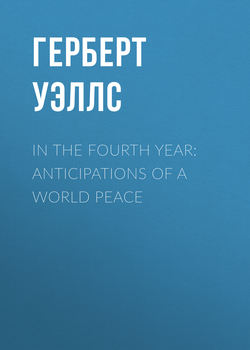In the Fourth Year: Anticipations of a World Peace

Реклама. ООО «ЛитРес», ИНН: 7719571260.
Оглавление
Герберт Уэллс. In the Fourth Year: Anticipations of a World Peace
PREFACE
I. THE WAY TO CONCRETE REALIZATION
II. THE LEAGUE MUST BE REPRESENTATIVE
III. THE NECESSARY POWERS OF THE LEAGUE
IV. THE LABOUR VIEW OF MIDDLE AFRICA
V. GETTING THE LEAGUE IDEA CLEAR IN RELATION TO IMPERIALISM
VI. THE WAR AIMS OF THE WESTERN ALLIES
VII. THE FUTURE OF MONARCHY
VIII. THE PLAIN NECESSITY FOR A LEAGUE
IX. DEMOCRACY
X. THE RECENT STRUGGLE FOR PROPORTIONAL REPRESENTATION IN GREAT BRITAIN
XI. THE STUDY AND PROPAGANDA OF DEMOCRACY
Отрывок из книги
More and more frequently does one hear this phrase, The League of Nations, used to express the outline idea of the new world that will come out of the war. There can be no doubt that the phrase has taken hold of the imaginations of great multitudes of people: it is one of those creative phrases that may alter the whole destiny of mankind. But as yet it is still a very vague phrase, a cloudy promise of peace. I make no apology therefore, for casting my discussion of it in the most general terms. The idea is the idea of united human effort to put an end to wars; the first practical question, that must precede all others, is how far can we hope to get to a concrete realization of that?
But first let me note the fourth word in the second title of this book. The common talk is of a "League of Nations" merely. I follow the man who is, more than any other man, the leader of English political thought throughout the world to-day, President Wilson, in inserting that significant adjective "Free." We western allies know to-day what is involved in making bargains with governments that do not stand for their peoples; we have had all our Russian deal, for example, repudiated and thrust back upon our hands; and it is clearly in his mind, as it must be in the minds of all reasonable men, that no mere "scrap of paper," with just a monarch's or a chancellor's endorsement, is a good enough earnest of fellowship in the league. It cannot be a diplomatist's league. The League of Nations, if it is to have any such effect as people seem to hope from it, must be, in the first place, "understanded of the people." It must be supported by sustained, deliberate explanation, and by teaching in school and church and press of the whole mass of all the peoples concerned. I underline the adjective "Free" here to set aside, once for all, any possible misconception that this modern idea of a League of Nations has any affinity to that Holy Alliance of the diplomatists, which set out to keep the peace of Europe so disastrously a century ago.
.....
But when we dismiss this idea of representation by states, we are left with the problem of the proportion of representation and of relative weight in the Council of the League on our hands. It is the sort of problem that appeals terribly to the ingenious. We cannot solve it by making population a basis, because that will give a monstrous importance to the illiterate millions of India and China. Ingenious statistical schemes have been framed in which the number of university graduates and the steel output come in as multipliers, but for my own part I am not greatly impressed by statistical schemes. At the risk of seeming something of a Prussian, I would like to insist upon certain brute facts. The business of the League of Nations is to keep the peace of the world and nothing else. No power will ever dare to break the peace of the world if the powers that are capable of making war under modern conditions say "No." And there are only four powers certainly capable at the present time of producing the men and materials needed for a modern war in sufficient abundance to go on fighting: Britain, France, Germany, and the United States. There are three others which are very doubtfully capable: Italy, Japan, and Austria. Russia I will mark – it is all that one can do with Russia just now – with a note of interrogation. Some day China may be war capable – I hope never, but it is a possibility. Personally I don't think that any other power on earth would have a ghost of a chance to resist the will – if it could be an honestly united will – of the first-named four. All the rest fight by the sanction of and by association with these leaders. They can only fight because of the split will of the war-complete powers. Some are forced to fight by that very division.
No one can vie with me in my appreciation of the civilization of Switzerland, Sweden, or Holland, but the plain fact of the case is that such powers are absolutely incapable of uttering an effective protest against war. Far less so are your Haytis and Liberias. The preservation of the world-peace rests with the great powers and with the great powers alone. If they have the will for peace, it is peace. If they have not, it is conflict. The four powers I have named can now, if they see fit, dictate the peace of the world for ever.
.....